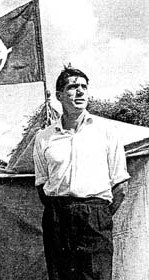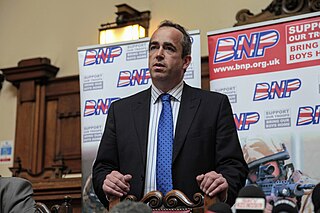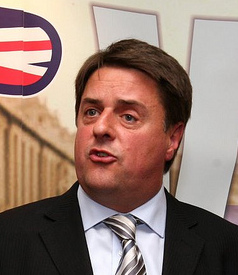The British National Party (BNP) is a far-right, British fascist political party in the United Kingdom. It is headquartered in Wigton, Cumbria, and is led by Adam Walker. A minor party, it has no elected representatives at any level of UK government. The party was founded in 1982, and reached its greatest level of success in the 2000s, when it had over fifty seats in local government, one seat on the London Assembly, and two Members of the European Parliament.

John Hutchyns Tyndall was a British fascist political activist. A leading member of various small neo-Nazi groups during the late 1950s and 1960s, he was chairman of the National Front (NF) from 1972 to 1974 and again from 1975 to 1980, and then chairman of the British National Party (BNP) from 1982 to 1999. He unsuccessfully stood for election to the House of Commons and European Parliament on several occasions.
John Edward Bean was a British political activist and writer, who was a long-standing participant in far-right politics in the United Kingdom, and a number of its movements.

Andrew Fountaine was an activist involved in the British far right. After military service in a number of conflicts, Fountaine joined the Conservative Party and was selected as a parliamentary candidate until his outspoken views resulted in his being disowned by the party.
Derek William Beackon is a British far-right politician. He is currently a member of the British Democratic Party (BDP), and a former member of the British National Party (BNP) and National Front. In 1993, he became the BNP's first elected councillor, although he served for only eight months.
Martin Wingfield is a British far-right politician. Wingfield is long-standing figure in the British nationalist movement, he and his wife, Tina Wingfield, having contested several elections since the 1980s.
Andrew Henry William Brons is a British politician and former MEP. Long active in far-right politics in Britain, he was elected as a Member of the European Parliament (MEP) for Yorkshire and the Humber for the fascist British National Party (BNP) at the 2009 European Parliament election and held the seat until May 2014. He was the chairman of the National Front in the early 1980s. He resigned the BNP whip in October 2012 and became patron of the far-right British Democratic Party. He did not seek re-election in 2014.
Anthony "Tony" Mark Lecomber is a British far-right activist and former British National Party (BNP) politician who was deputy leader of the BNP from 1999 to 2006.
Mark Adrian Collett is a British neo-Nazi political activist. He was formerly chairman of the Young BNP, the youth division of the British National Party (BNP), and was director of publicity for the party.
Far-right politics in the United Kingdom is a recurring phenomenon in the United Kingdom since the early 20th century, with the formation of Nazi, fascist and antisemitic movements. One of the earliest examples of Fascism in the UK can be found as early as 1923 with the formation of British Fascisti by Rotha Lintorn-Orman. It went on to acquire more explicitly racial connotations, being dominated in the 1960s and 1970s by self-proclaimed white nationalist organisations that opposed non-white and Asian immigration. The idea stems from belief of white supremacy, the belief that white people are superior to all other races and should therefore dominate society. Examples of such groups in the UK are the National Front (NF), the British Movement (BM) and British National Party (BNP), or the British Union of Fascists (BUF). Since the 1980s, the term has mainly been used to describe those groups, such as the English Defence League, who express the wish to preserve what they perceive to be British culture, and those who campaign against the presence of non-indigenous ethnic minorities.
Edward Mark Butler is a former National Elections Officer of the British National Party (BNP) and was dubbed the party's "elections guru" by its newspaper, Voice of Freedom, until being suspended and expelled from the BNP in 2010 by Nick Griffin. He then became a member of the English Democrats before becoming associated with the For Britain Movement.
Richard Charles Edmonds was a British far-right politician and activist. He was the deputy chairman and national organiser of the British National Party (BNP) and also prominent in the National Front (NF) during two spells of membership.
John Morse is a British political activist involved with the far-right. He was a leading figure in the British National Party under John Tyndall, serving alongside Richard Edmonds as Tyndall's closest ally in the party.

Simon Darby is a British politician and former deputy chairman of the British National Party.
This article lists the British National Party's election results in the UK parliamentary, Scottish parliamentary and Welsh Assembly elections, as well as in the European Parliament elections and at a local level.

Nicholas John Griffin is a British politician who represented North West England as a Member of the European Parliament (MEP) from 2009 to 2014. He was chairman and then president of the far-right British National Party (BNP) from 1999 to 2014, when he was expelled from the party.
The British National Party (BNP) leadership election of 2011 was triggered on 28 June 2011 when the party adopted a new constitution that required a leadership election to take place every four years. Two candidates stood in the leadership election: Nick Griffin and Andrew Brons. On 25 July 2011, the results of the leadership election were announced, with Griffin being named the winner by just 9 votes. Griffin had secured 1,157 votes compared to the 1,148 votes for Brons.
The British National Party (BNP) is a far-right political party in the United Kingdom formed as a splinter group from the National Front by John Tyndall in 1982 and was led by Nick Griffin from September 1999 to July 2014. Its current chairman is Adam Walker. The BNP platform is centred on the advocacy of "firm but voluntary incentives for immigrants and their descendants to return home", as well as the repeal of anti-discrimination legislation. It restricted membership to "indigenous British" people until a 2010 legal challenge to its constitution.
Adam Walker is a British far-right politician who is the chairman of the British National Party (BNP). He was elected in a leadership election on 27 July 2015, having previously been appointed acting chairman by the National Executive when the then-leader, Nick Griffin, resigned.




